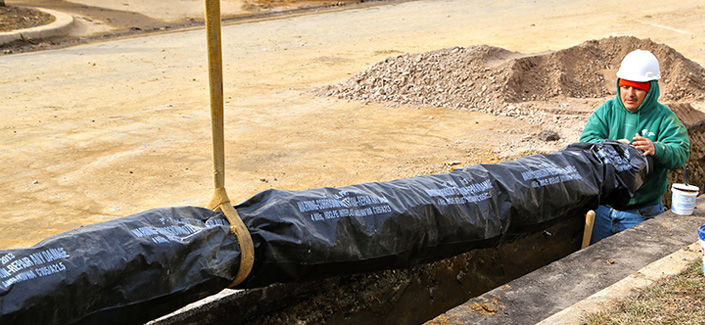Plastic Wrap Helps Preserve Water Mains
June 3, 2016

Protecting the Prince William County Service Authority’s underground infrastructure from corrosion is another way to ensure reliable water service to the utility’s customers.
Corrosion can contribute to water main breaks, especially in ductile iron pipe which comprises more than 70 percent of water mains across Prince William County. To combat this, the Service Authority requires new pipe to be wrapped in a plastic called Polyethylene. This thick, durable substance insulates the pipe from potential corrosion. The Service Authority also coats all the fittings and fasteners with rubberized mastic, a sealant that essentially does the same job as plastic wrap.
“Whether it’s due to the composition of the soil the pipe is placed in, the structural integrity of the pipe when it was built, or the water lines’ proximity to other utility lines, some form of corrosion will likely occur with metal pipes,” said Collections and Distribution Manager Doug Shoop. “By wrapping the pipes in plastic and coating the fittings and fasteners, corrosion is less likely to occur because it has virtually no exposed metal to conduct with.”
Recently, the Service Authority completed a number of water main replacement projects that involved the wrapping process. One such project was the Melrose Water Main Replacement project in Triangle, which entailed replacing a mile’s worth of old cast iron pipe with wrapped ductile iron pipe in an older apartment community. In the last two years alone, the Service Authority has placed 36 miles of wrapped ductile iron water main in the ground across Prince William County.
The Service Authority has also installed pipes from polyethylene-based plastic along Lee Highway in Gainesville due to the highly acidic soil in that location. These style pipes offer strong protection against corrosion, said Utility Inspections Manager Conrad Holtslag.
“We want to preserve the pipe today, so it maintains its integrity tomorrow,” said Holtslag. “Once it’s in ground, it is very expensive to take out.”





